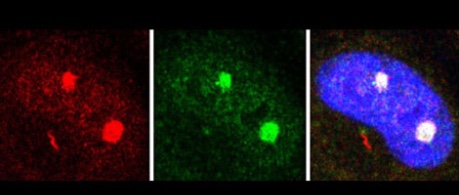Thursday 11th May 2017, 11:30am
Fresh insights into how the Human Cytomegalovirus replicates could pave the way for new thereapies to stop its spread.
Human Cytomegalovirus (HCMV) infection is extremely common. It infects at least a third of the populations in the developed world and up to 100% of people in developing countries.

Infection during pregnancy can lead to hearing loss and intellectual disabilities in unborn babies.
The virus can be life-threatening for people with a weakened immune system, such as transplant receipients and people infected with HIV.
Dr Finn Grey and colleagues at The Roslin Institute found that the virus is dependent on a molecule called VCP to replicate its genetic material and multiply. By blocking the molecule with a chemical inhibitor the researchers stopped the virus from multiplying.
This method is 10 times more powerful at stopping the virus than existing medications that taret HCMV directly. VCP is a component of the infected cell rather than a substance produced by the virus itself. By targeting the affected cells instead of the virus, the approach could also reduce the chances of the virus becoming resistant to the therapy.
Drugs that target the VCP molecule are already being developed as potential therapies for cancer. However, before they can be tested as an antiviral therapy, further studies are required to check that they are safe.
"Human Cytomegalovirus infection is an important human disease. By gaining a better understanding of how the virus works, we can develop improved antiviral drugs. While more work is required, this study shows the potential of such approaches."
The study is published in the journal PLOS Pathogens. The Roslin Institute receives strategic funding from the Biotechnology and Biological Sciences Research Council.
For further information, please contact:
Jen Middleton
Press & PR Office
T: 0131 650 6514
E: Jen.middleton@ed.ac.uk
Original article: Lin Y-T, Prendergast J, Grey F (2017) The host ubiquitin-dependent segregase VCP/p97 is required for the onset of human cytomegalovirus replication. PLoS Pathog 13(5): e1006329. https://doi.org/10.1371/journal.ppat.1006329